Pril Smiley (born 19 March 1943) is an American composer and pioneer of electronic music.
Pril Smiley (born 19 March 1943) is an American composer and pioneer of electronic music.
Pril Smiley was born in Mohonk Lake, New York. She worked at the Columbia-Princeton Electronic Music Center in the 1960s and 1970s with Milton Babbitt, Otto Luening, Vladimir Ussachevsky, Mario Davidovsky and Alice Shields. She became one of four primary instructors in electronic music at the center [1] and also served as director. From 1968 to 1974 she worked as a consultant to the Lincoln Center Repertory Theater in New York City and was awarded a Guggenheim Fellowship in 1975. She ended her career as a composer in the mid-1980s, but continued to teach, and retired from Columbia in 1995. Her works have been performed internationally. [2]
Smiley composed over forty works for film, theater and dance. Selected works include:
The Computer Music Center (CMC) at Columbia University is the oldest center for electronic and computer music research in the United States. It was founded in the 1950s as the Columbia-Princeton Electronic Music Center.
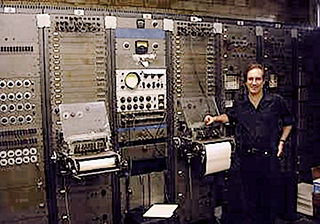
The RCA Mark II Sound Synthesizer was the first programmable electronic synthesizer and the flagship piece of equipment at the Columbia-Princeton Electronic Music Center. Designed by Herbert Belar and Harry Olson at RCA, with contributions by Vladimir Ussachevsky and Peter Mauzey, it was installed at Columbia University in 1957. Consisting of a room-sized array of interconnected sound synthesis components, the Mark II gave the user more flexibility and had twice the number of tone oscillators as its predecessor, the Mark I. The synthesizer was funded by a large grant from the Rockefeller Foundation.
Otto Clarence Luening was a German-American composer and conductor, and flutist. He was an early pioneer of tape music and electronic music.
Mario Davidovsky was an Argentine-American composer. Born in Argentina, he emigrated in 1960 to the United States, where he lived for the remainder of his life. He is best known for his series of compositions called Synchronisms, which in live performance incorporate both acoustic instruments and electroacoustic sounds played from a tape.
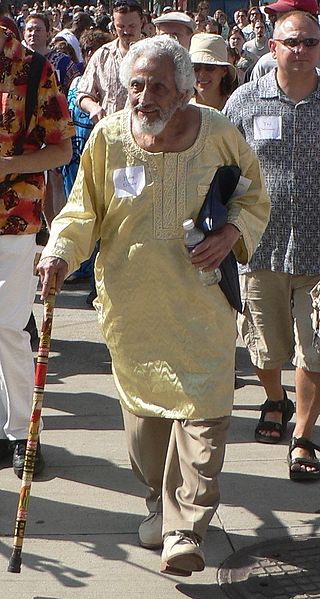
Halim Abdul Messieh El-Dabh was an Egyptian-American composer, musician, ethnomusicologist, and educator, who had a career spanning six decades. He is particularly known as an early pioneer of electronic music. In 1944 he composed one of the earliest known works of tape music, or musique concrète. From the late 1950s to early 1960s he produced influential work at the Columbia-Princeton Electronic Music Center.
Vladimir Alexeevich Ussachevsky was a composer, particularly known for his work in electronic music.
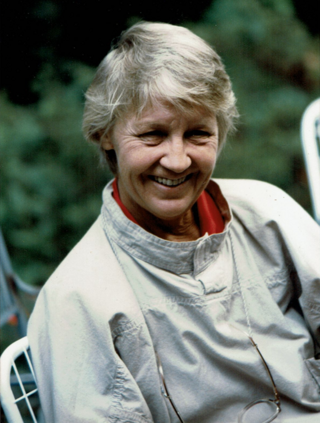
Ruth Anderson was an American composer, orchestrator, teacher, and flutist.
Alice Shields is an American classical composer. She is one of the pioneers of electronic music, and is particularly known for her cross-cultural operas.
Bülent Arel was a Turkish-born composer of contemporary classical music and electronic music.
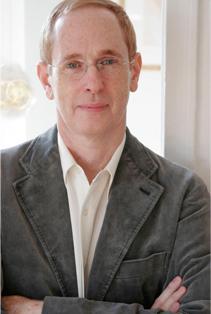
Conrad Cummings is an American composer of contemporary classical music. His compositions include works for orchestra, as well as operatic and chamber works. Many of his works are composed in a minimalist style reminiscent of that of Philip Glass.
Composers Recordings, Inc. (CRI) was an American record label dedicated to the recording of contemporary classical music by American composers. It was founded in 1954 by Otto Luening, Douglas Moore, and Oliver Daniel, and based in New York City.
The Group for Contemporary Music is an American chamber ensemble dedicated to the performance of contemporary classical music. It was founded in New York City in 1962 by Joel Krosnick, Harvey Sollberger and Charles Wuorinen and gave its first concert on October 22, 1962 in Columbia University's MacMillin Theatre. Krosnik left the ensemble in 1963. It was the first contemporary music ensemble based at a university and run by composers.
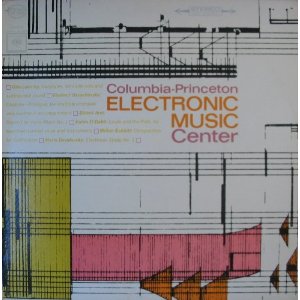
Columbia-Princeton Electronic Music Center was an album of electronic music released in 1964. It was the recording of a concert performed at the McMillin Theater at Columbia University on May 9 and 10, 1961. The stereo version was MS 6566 and the monophonic version was ML 5966. There was a sequel released in 1998 on the New World label titled Columbia-Princeton Electronic Music Center 1961–1973. Bülent Arel is the only artist who appears on both albums.
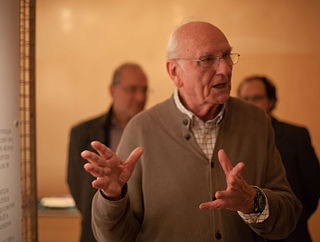
Andrés Lewin-Richter Ossiander is a Spanish composer of electronic music.

OHM: The Early Gurus of Electronic Music is a compilation of early electronic music and excerpts from 1948 to 1980. Many works are essentially experiments with sound, using a variety of non-traditional instruments including homemade circuits, tape ribbon, and early synthesisers.
George Balch Wilson was an American composer who is known for his contributions to electronic music. In 1955 he won the Prix de Rome for composition. He taught for more than 30 years on the faculty of the University of Michigan where he founded and directed the school's electronic music studio. Upon his retirement he was made a professor emeritus.
Robert Miller was an American pianist and attorney.
The Chamber Music Conference and Composers' Forum of the East (CMC) is a summer conference that brings together amateur musicians, professional faculty, and composers-in-residence to study and play chamber music. The CMC was founded in 1946, and most of its summer sessions have been held at Bennington College in Bennington, Vermont. After the 2019 session, the CMC announced its relocation to the campus of Colgate University in Hamilton, New York, to begin with its 75th anniversary session in 2022. There was a limited 2021 program at Bennington College.
Michiko FrancoiseToyama Muto was a Japanese American composer. She was one of the first women invited to study at the Columbia–Princeton Electronic Music Center.